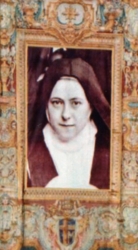St. Therese of Lisieux, patroness of the missions
St. Therese, popularly known as “The Little Flower,” was born in Alencon, France in 1879 as the last of nine children. At the age of 15 she entered the Carmelite monastery at Lisieux. Two years later she made her profession and was given the name Theresa of the Child Jesus, following the name of St. Theresa of Avila. St. Therese died at the age of 24 following a long debilitating illness. She was canonized a saint by Pope Pius XI in 1925, and two years later she was declared patron of the missions alongside St. Francis Xavier. The fecundity of mission work depends not only on the active work of missionaries but also the spiritual support of prayers and sacrifices. Pope John Paul II in his exhortation “On the Consecrated Life and its Mission in the Church and the World” wrote “a sense of mission is essential in every institute, not only those dedicated to the active apostolic life, but also those dedicated to the contemplative life.’’
Throughout her life Therese wanted to be a missionary, a vocation which was nurtured in the family home. In her biography “Story of a Soul,” she relates that at the age of eight, “Papa rewarded me by giving me a pretty little coin worth four sous. I placed in a box ... It was from this box that I drew my offerings on the big feasts when there were special collections for the Propagation of the Faith.” At the end of her life, in a conversation with her blood sister, Mother Agnes, she asked that instead of purchasing flowers after her death, the money should be contributed to the missions to baptize and support little girls who were found abandoned.
One of the reasons why Therese choose the Lisieux Carmel was that it was responsible for the foundation of Carmel in Indo China Saigon in 1861, and Hanoi in 1895. As a sister she gave serious consideration of moving to the Carmel in Saigon with the approval of her community. She prayed that a sign would be given to her, having interceded with the martyr Theophane Venard. That sign was given when her delicate health took a turn for the worse.
She treasured the hope that one of her two brothers might become a priest, but they died in infancy. Undaunted, she found two missionary brothers that were seeking spiritual sponsorship. Their names were Father Maurice Belliere and Father Adolphe Roulland. In her letters to them she speaks of “love in the heart of the Church.” In another letter she wrote “if love were to become extinct, apostles would not preach the Gospel.” Throughout she was very clear about how both the contemplative and the active ministry serve to complement one another in saying “our roles will remain the same, yours apostolic weapons, mine prayer and love.” Toward the end of her life she dreamed of how she would continue her missionary work from her place in heaven. Reflecting on the new freedom she will enjoy in heaven, she wrote, “There will be no longer any cloister and grilles and my soul will be able to fly with you into distant missions.”
Therese’s spirituality of simplicity breaks through in her meditation on her soul garden. Perfection lies not in greatness but “in doing his will and being what he wants us to be.” While she had a clear preference for roses, she added, “I understand that if all flowers wanted to be roses, nature would lose her springtime beauty, and fields would no longer be decked out with wild flowers.” Following her spirituality of the “little way,” she was content to be a daisy or a violet.
In conclusion I would like to thank all our regular donors who sponsor our missionary priests, both by their prayers and their “sous” offerings. Following the example of St. Therese perhaps you would like to sponsor a missionary brother? We would be pleased to provide you with a photograph and some information about their missionary work. Now is also the time to leave clear instructions that instead of purchasing flowers on the occasion of your funeral, all donations are to be forwarded to St. James Society in support of the missions.
St. Therese wanted to do “big deeds,” such as giving her life as a martyr to gain God’s attention, but she later realized that “the little way” of doing small things out of love is what God was asking of her. Offering her life for the spread of the faith and the salvation of souls on the missions became her life’s work. Although she never set foot on missionary soil she was declared “Patroness of the Missions” by Pope Pius XI in 1927. The mission work of evangelization requires the twin components of prayer and action without which there can be no fruits.
Therese suffered from spiritual dryness, sometimes described as “the dark night of the soul.” Humorously she commented “Jesus isn’t doing much to keep the conversation going.” She wrote that at times she even fell asleep during prayer, but comforted herself by thinking how parents loved their children in sleep, which would be the way that God would respond to her in similar conditions.
Msgr. Finbarr O’Leary is the director of the Missionary Society of St. James the Apostle.



















